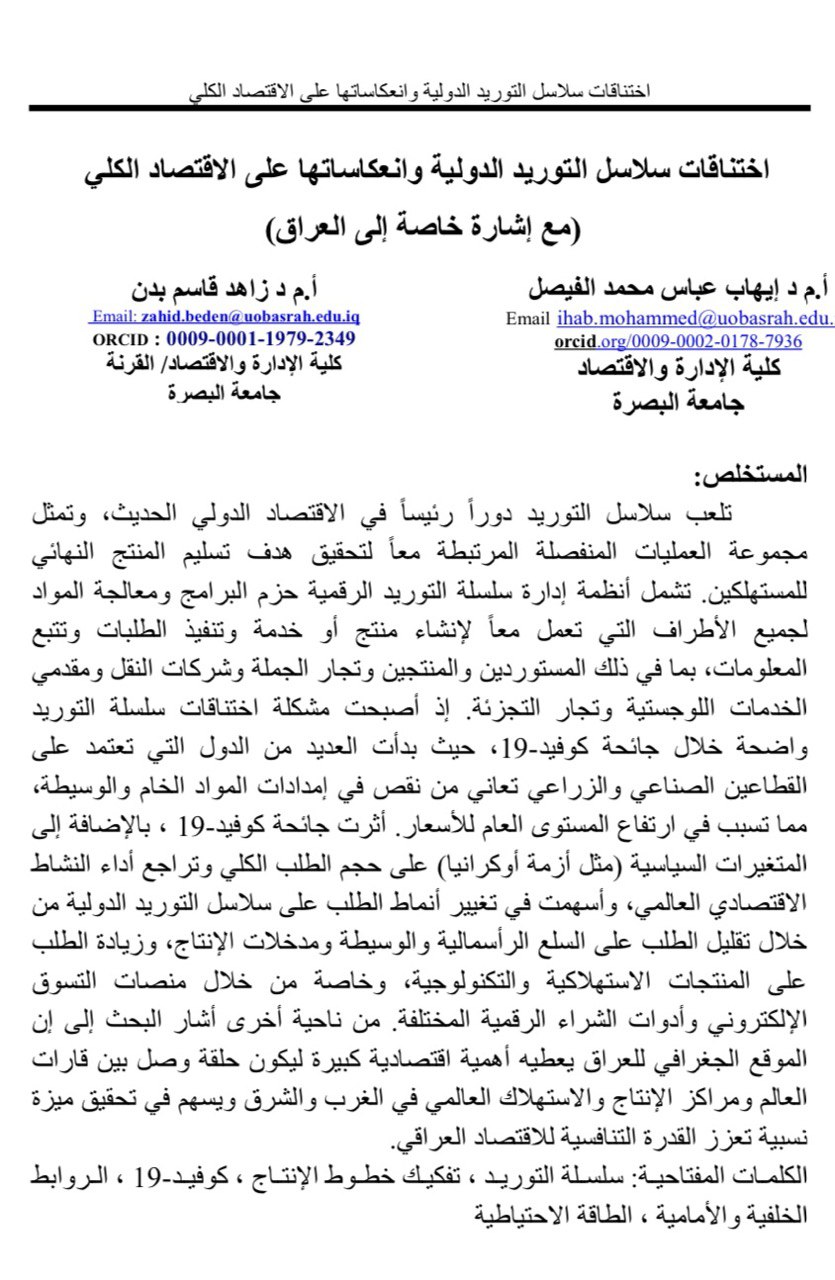اختناقات سلاسل التوريد الدولية وانعكاساتها على الاقتصاد الكلي (مع إشارة خاصة إلى العراق)
محتوى المقالة الرئيسي
الملخص
تلعب سلاسل التوريد دوراً رئيساً في الاقتصاد الدولي الحديث، وتمثل مجموعة العمليات المنفصلة المرتبطة معاً لتحقيق هدف تسليم المنتج النهائي للمستهلكين. تشمل أنظمة إدارة سلسلة التوريد الرقمية حزم البرامج ومعالجة المواد لجميع الأطراف التي تعمل معاً لإنشاء منتج أو خدمة وتنفيذ الطلبات وتتبع المعلومات، بما في ذلك المستوردين والمنتجين وتجار الجملة وشركات النقل ومقدمي الخدمات اللوجستية وتجار التجزئة. إذ أصبحت مشكلة اختناقات سلسلة التوريد واضحة خلال جائحة كوفيد-19، حيث بدأت العديد من الدول التي تعتمد على القطاعين الصناعي والزراعي تعاني من نقص في إمدادات المواد الخام والوسيطة، مما تسبب في ارتفاع المستوى العام للأسعار. أثرت جائحة كوفيد-19 ، بالإضافة إلى المتغيرات السياسية (مثل أزمة أوكرانيا) على حجم الطلب الكلي وتراجع أداء النشاط الاقتصادي العالمي، وأسهمت في تغيير أنماط الطلب على سلاسل التوريد الدولية من خلال تقليل الطلب على السلع الرأسمالية والوسيطة ومدخلات الإنتاج، وزيادة الطلب على المنتجات الاستهلاكية والتكنولوجية، وخاصة من خلال منصات التسوق الإلكتروني وأدوات الشراء الرقمية المختلفة. من ناحية أخرى أشار البحث إلى إن الموقع الجغرافي للعراق يعطيه أهمية اقتصادية كبيرة ليكون حلقة وصل بين قارات العالم ومراكز الإنتاج والاستهلاك العالمي في الغرب والشرق ويسهم في تحقيق ميزة نسبية تعزز القدرة التنافسية للاقتصاد العراقي.
تفاصيل المقالة

هذا العمل مرخص بموجب Creative Commons Attribution-ShareAlike 4.0 International License.
المراجع
- Abdullah, Muhammad Issa and Ibrahim, Musa. (1998). International Economic Relations, Beirut, the Lebanese House of Manhal.
- Abdul Ghaffar, Hana. (2002). Foreign direct investment and international trade (China as a model), Baghdad, House of Wisdom.
- Abdel-Reda, Nabil Jaafar (2015). The development of economic thought from Plato to Friedman, Basra, Al-Ghadeer Printing and Publishing Company.
- Abdel-Ridha, Nabil Jaafar. (2013). In the face of backwardness, Basra, Al-Ghadeer Printing and Publishing Company.
- Abd al-Razzaq, Munther Abdullah. (2014). Iraq's website in international trade, Alexandria, first edition, Dar al-Ma'rifah for printing and publishing.
- Abu Khashaba, Muhammad Mahmoud and Sultan, Ashraf Fouad. (2019). Supply Chain Management (Entrance to Logistics Jobs), Alexandria, Economics Library.
- Al-Hajjar, Bassam. (2003). International economic relations. Beirut, University Institute for Studies, Distribution and Publishing (Majd)
- Al-Harazi, Muhammad Ali Awad. (2007). The economic role of free zones in attracting investments (a comparative study), Beirut, Al-Halabi human rights publications
- Al-Omari, Manahil Mustafa Abdel-Hamid. (2022). Microeconomic analysis (theories - policies - applications), Baghdad, Iraq Library for printing and publishing.
- Al-Taweel, Akram Ahmed and Al-Abadi, Shahla Salem Khalil (2018). Green Supply Chain Management (GSCM), Amman, Dar Al-Yazourdi Scientific.
- Al-Tikriti, Haifa Abdel-Rahman Yassin. (2009). The mechanisms of economic globalization and its future effects on the Arab economy, Amman, Dar Al-Hamid.
- Agarwal, Rocher and Kimball, Miles. (2022). Will Inflation Remain High?, International Monetary Fund, Finance and Development Journal, Issue (59), Volume (2)
- Baldwin, Richard (2013). Changing features of global value chains, Fung Global Institute (FGI), Nanyang Technological University (NTU), and World Trade Organization (WTO)
- Cerdero, Diego and Hansen, Nils-Jacob. (2022). Back to Basics (Supply Chain Extension), International Monetary Fund, Finance and Development Journal, Issue (59), Volume (2).
- Dent, Julian. (2021). Distribution channels (understanding and managing them in the market), translated by: Aisha Hamdy, Arab Nile Group.
- Hatem, Sami Afifi. (1993). Foreign Trade between Theorizing and Organization, Cairo, The Egyptian Lebanese House.
- Joseph Stiglitz. (2006). Making Globalization Work (New York: Norton.
- Kafi, Mustafa Youssef. (2021). Logistics Department, Green Physical Supply and Distribution, Amman, Dar Academicians for Publishing and Distribution.
- Khaled, Muhammad. (2022). Climate change... a storm hitting supply chains, available at: https://www.albayan.ae/world/global/2022-08-14-1.4494172
- MacCarthy, B.L., Blome, C., Olhager, J., Sarai, J.S., & Zhao, X. (2016). Supply Chain Evolution - Theory, Concepts and Science, International Journal of Operations & Production Management.
- Michael Deich,. (2006). Growth Opportunity and Prosperity in a Globalizing Economy, Hamilton Project, Brookings Institution.
- Park, Albert & Nayyar, Gaurav and Low, Patrick (2013). Supply Chain Perspectives and Issues , wto- ilibrary WTO.
- Rifai, Mamdouh Abdel-Aziz Mohamed. (2008). The impact of the application of electronic supply chain management on the phenomenon of reverse withdrawal of inventory in light of the sharing of demand information - an applied study on durable goods, Kuwait, Knowledge World for printing and publishing.
- Robin Meredith. (2009). The Elephant and the Dragon: The Rise of India and China, and Its Significance for All of Us, Translated by: Shawqi Jalal, Alam Al-Maarifa for Printing and Publishing, Kuwait, Issue No. 395.
- Robert. H. Cassen, and Tim Dyson. (2006). Demographic Transition in W? and Its Consequences.
- Shehab, Magdy Mahmoud. (2007). Contemporary International Economics, Alexandria, New University House.
- Terence Chea.(2006). China's Growing Air Pollution Reaches American Skies, Associated Press.
- Terry Campbell, and David U. Himmelstein. (2016). Cost of Health Care Administration in the United States and Canada, New England Journal of Medicine, Aug. 24. 21..
- UNCTAD. (2013). The Impact of Trade on Employment and Poverty Reduction, Geneva, United Nations.
- Zini, Muhammad Ali. (2009). The Iraqi Economy (Past, Present and Future Options), Baghdad, Dar Al-Malak.
